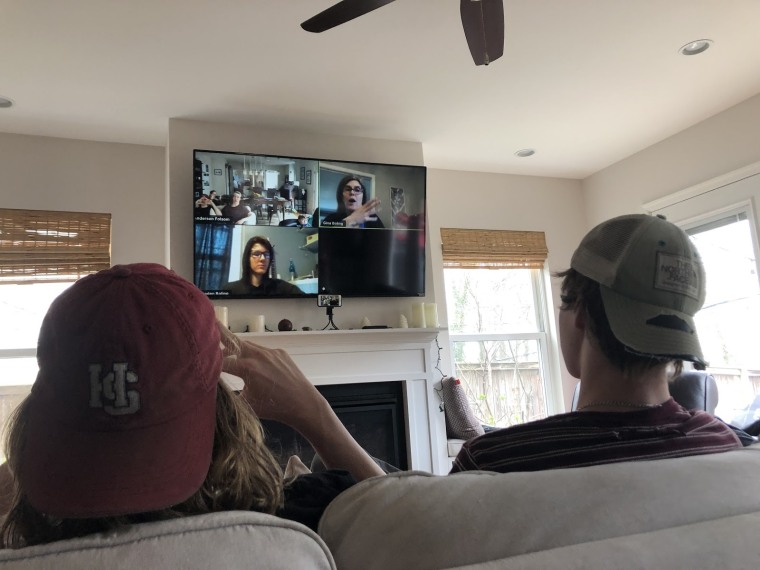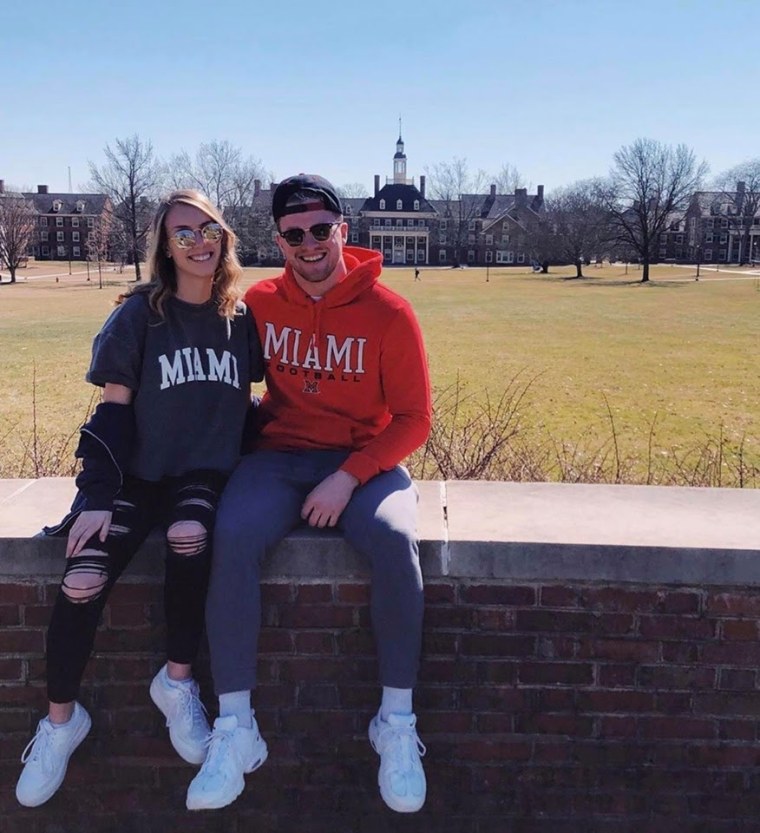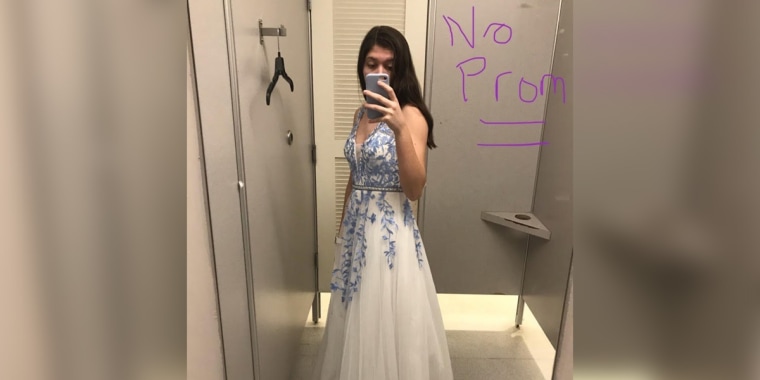Just a few weeks ago, high school seniors across America were focused on milestones like graduation, prom or taking the court for one last game.
And now, with the coronavirus epidemic, that reality has been flipped on its head. Instead, many seniors wonder how or if they will graduate. And after high school, will there be jobs in a global recession? Or will they be able to afford college if mom or dad just got laid off?
In my house, we have two high school seniors. My twin sons Josh and Will, who are notorious for complaining about having to go to school every day, are now in a funk over missing their normal routine, sports and friends.
“Our birthday next week is going to suck,” Josh told me the other night. “I can't believe I won't see my friends for months," said Will.
While Virginia is one of four states that has shuttered schools statewide for the remainder of the year, high school seniors across the country are at home wondering “what next,” and in typical teenager fashion, “why me?”
Our high school seniors are going through an emotional rollercoaster. I turned to a few experts and parents of high school seniors to find out what’s working and how we can best support our kids through this difficult time.
Prepare for a range of emotions
In normal circumstances, the teenage experience is hallmarked by big emotions. In my house, this ranges from surliness, to squabbles, to sulking — sometimes in a matter of minutes.
RELATED: Mika's message to parents of teens during the coronavirus outbreak
Kelly Funk, a middle school media specialist in Leavenworth, Kansas, can relate. “She’s mad, she’s just very angry,” Funk said of senior daughter, Shannon, when describing her reaction that school was closed for the rest of the year.
“She is very upset because she’s very active in leadership, sports and academics. And she can't do any of that now,” said Funk. “Her father and I keep reminding her that everyone is in the same boat, it’s not fair, but you’re not alone.”

Andrea Sanderson, a psychotherapist and mother of three teen boys (including two high school seniors) said many teens, particularly seniors, are struggling. To help work through the range of emotions, Sanderson said you have to "realize it's not linear, there are ups and downs. Some days you will think things are going well, but other days will be sadness, frustration, and general grumpiness."
Sanderson said that students with pre-existing anxiety and depression diagnoses may have symptoms exacerbated by current conditions. But even for students without those diagnoses, Sanderson urges parents to "have a lot of empathy for all of the 'lasts' that they are missing.”
Acknowledge that this is a big deal
Don’t sweep their feelings under the rug.
“You need to just be there with them in their disappointment,” said Kate McCauley, founder of the Center for Parents and Teens and adjunct professor at the College of Education and Human Development at George Mason University.
“It’s going to look overly dramatic to us, because we have life perspective. Talk about your own disappointments in life, but don’t make it about you. Meet them with compassion. Acknowledge the disappointment. Empathize,” she added.
RELATED: Coronavirus: What public health workers are telling their children
"For many seniors, this is like grief,” said Sanderson. “And they don't know how to process this. You have to regulate your own emotions so that you can help your seniors process theirs."
Offer alternate milestones
Offer alternatives to some of the big milestones they are missing, but don’t forget to acknowledge it may be different than what they were expecting.
In our house, for example, the twins are having a virtual birthday party on Zoom next week to celebrate their 18th birthday, with the added bonus that their friends and family from all over the country can join. Instead of a fire pit driveway party with a dozen local friends, we will be sending an invite to a virtual party of up to 100 people on Zoom. A younger neighbor's birthday this week was met with a parade of cars passing by, honking and cheering and displaying "Happy Birthday" signs.
And while an online or in-car graduation ceremony, where graduates caravan across the school parking lot in individual cars, isn’t what was initially planned, it’s a story that can’t be told by any class before them.
Make peace with social media
“Thank goodness for FaceTime and social media; I never thought I would say that!” said Karen Hockins of Carmel, Indiana, mother to a high school senior Julia. “As soon as the illness affected the United States, we immediately limited her time outside of the house. This was very difficult, as there were many parents who were still letting their kids hang out with friends and even go to parties.”
Citing her duty to others in the community to stay home and not risk spreading the virus, Hockins enforced limiting access to friends. “Without social media, she would be almost completely disconnected from all her peers. I'm glad they have these tools so they can talk about it and support one another.”

Sanderson is looking to the positives of social media with her sons, from virtual college visits to online selection-matching applications for freshmen-year roommates. "This is where they are, let the social media help for once."
Share perspective, gently
Funk knew her daughter was tired of hearing from her directly, so she shared Chris Dier’s open letter to high school seniors with her.
Dier, Louisiana's 2019 Teacher of the Year who missed his senior year when Hurricane Katrina struck in 2005, eloquently put the coronavirus pandemic into perspective. He gave assurance that you do, in fact, come out on the other side.
RELATED: Locked down with your spouse? 7 ways to stay sane
McCauley suggested using this type open dialogue about the big losses, particularly prom. “This is a big loss for you, something you were looking forward to for a long time. Dad and I were really looking forward to taking photos and embarrassing you as you went off. This is disappointing for us too. I am here to listen to you, and help you come up with other ways we can celebrate,” she said as an example.
In many ways, this encapsulates what’s so hard about our seniors leaving home. We want to help as much as possible and eliminate heartbreak to the best of our abilities. We want to be there when the inevitable happens. But ultimately, these almost-adults are writing their own narratives.
“This is going to make a great story for you, you can decide how it goes and how it ends,” McCauley advised when communicating with seniors. “You can decide to be the person to say when you are 40 that ‘we were the class that didn’t get a prom or graduation.’ Or you can say ‘this is the class that had their graduation online, or at the following fall’s homecoming, and then we all went on to do great things.’”
Jennifer Folsom is vice president of client delivery at Washington, D.C.-based management consulting firm RIVA Solutions Inc. She lives in Alexandria, Virginia, with her husband Ben and three sons, 17-year-old twins Josh and Will, and 12-year-old Anderson. Her practical guide to modern working motherhood," The Ringmaster," is out now.
